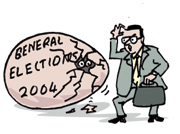| The Sunday Times Economic Analysis By the Economist | ||||||
| |
||||||
Best
practices for any government One of the cardinal errors of both parties when in power has been their inability to form a cabinet with a reasonable and manageable number and to allocate cabinet functions in a rational manner to achieve efficient implementation of their policies. The bifurcation of economic actives into several ministries and a huge number of cabinet ministers have been an overpowering factor in their inefficiencies. That coalition politics and sectarian interests dictate a larger number than desired has to be recognised. Yet, making of a huge cabinet with an irrational allocation of functions and all sorts of other ministers whose powers and functions are vague, obscure and uncertain has been the beginning of the undoing of both previous governments. The business community has done well to suggest that the number and the subjects of cabinet portfolios be determined once and for all. A constitutional amendment to effect this would indeed be a step in the right direction. Till this is done it would be a good practice for the government to be guided by the suggestions of the JBiz proposals. A consensus among the parties to effect this would indeed ensure greater economic efficiency. The need for a slim and efficient cabinet has been voiced by many including some political parties. It is time to ensure this in the new cabinet. The continuity of economic policies is vital if the country is to retain investor confidence. This does not mean that all policies should remain the same after an election. In fact some changes are vital in the light of economic experience and the perceptions and views of the people. Yet a broad framework of policies must be agreed upon. In 1994,for the first time, the two main political coalitions pursued similar economic policies. There was a reversal of the previous policies of the SLFP led coalition and for the first time there was continuity in economic policies. The PA government was responsible for some of the most significant privatisations such as Sri Lanka Telecom, NDB and the plantations. Will there be a continuity of the broad framework of policies that has been one of the features of the last quarter century, unlike in the post independent period till 1977? There is a vital need for a consensus on several areas of economic and social policy that require reform. Without a consensus on educational and health reforms, so vital for the country's economic and social advancement, the country would continue to slide down in the economic and social totem pole, as it has done in recent decades. It is better for the main parties to agree on a set of policies that could be implemented and pursue these than make these reforms political issues that retard progress in these vital areas for the long term economic growth and social advancement. There can be no doubt that the most important area for a bipartisan approach is the peace settlement. Unless the two main political groups can get together, there is no real prospect of a durable and sustainable settlement to this all-important national issue upon which economic prosperity depends. As the Institute of Policy Studies emphasised in its State of the Economy Report: "The most significant determinant of the pace of economic growth is the attainment of a permanent and durable settlement to the ethnic problem.... If a permanent settlement of the ethnic problem is not realised in the foreseeable future, the short and medium term economic performance will not benefit from a full peace dividend. The country is likely to reap only a partial interim dividend. More specifically this scenario means that the country would not be able to utilise the full amount of aid committed by the donors over the next four years. Economic activities and development projects in certain areas of the North and East would be stultified and business and foreign investor confidence would not be fully restored." Political divisions have been the bane of the country's economic development and social progress. Will the new configuration of power enable a new approach to national issues and ensure economic progress? That is the question uppermost in the mind of the nation. |
||||||
Copyright © 2001 Wijeya Newspapers Ltd. All rights reserved. |
 This
column is being written before the ballots are cast. It will be
read after the election results are known. Therefore it would be
useful to reflect on some best practices for the economy that may
be followed by whosoever forms the new government.
This
column is being written before the ballots are cast. It will be
read after the election results are known. Therefore it would be
useful to reflect on some best practices for the economy that may
be followed by whosoever forms the new government.